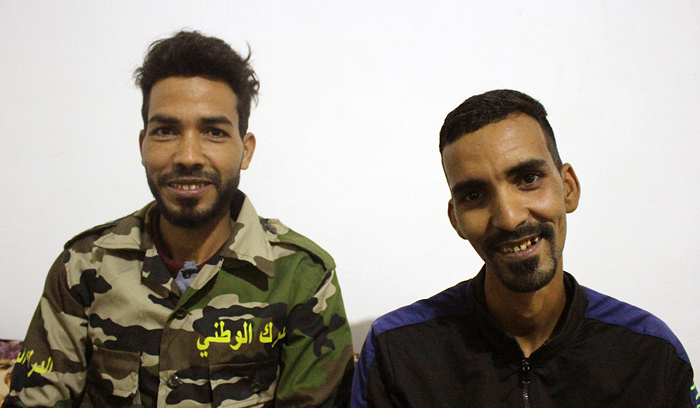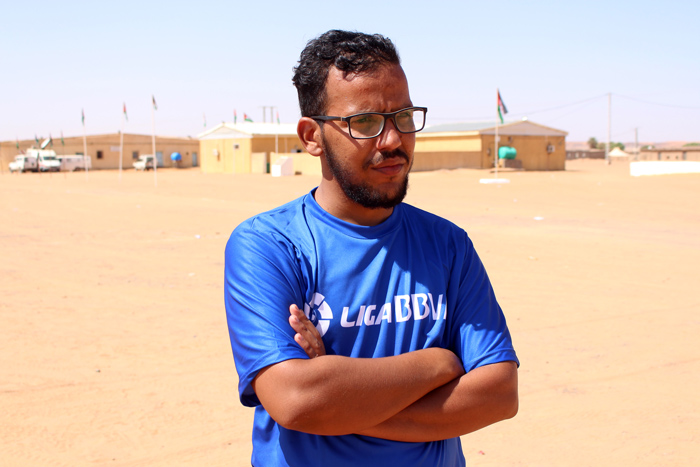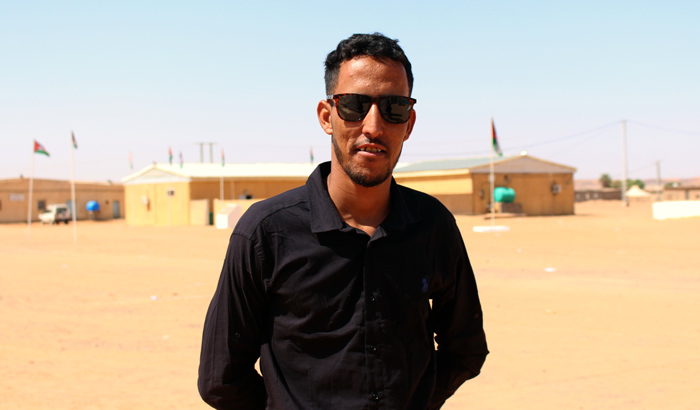News
“Better to fight than to stand still thinking that the UN or peace will bring you freedom”
“Morocco will not admit that we are right. It won’t happen. At least, we will die trying to improve our future,” says Nih. As night falls in Boujdour —one of the five wilayas in which the Sahrawi refugee camps have been organised for the last 46 years in Algeria’s Tindouf— Nih, Yusef and I drink tea on the carpet that Aicha has just placed at the door of her house. “Here, in this shelter, we have no future,” Yusef adds, stressing Nih’s words.
Both are 28, and know each other because they have worked together at the National Radio Television of the Sahrawi Arab Democratic Republic (SADR). It is located in Rabuni, the camps’ administrative centre. Despite the fact that the two young men live in different wilayas, they have often shared a roof, their sleeping hours, and tea in a room next to the broadcasting station.
War or journalism?
“We won’t stop till victory,” Yusef says as he places a kettle on the campfire he has just lit in front of me. When I first met him in 2017, in the first project we organised under the Un Micro para el Sáhara association, Yusef was a journalist and cameraman for SADR TV. He is now a soldier in the second military region. A week ago he came back from the liberated territories, where he daily took part in attacks on the wall. He received military training in the camps from 2010 to 2013, but decided to try his hand at techniques and journalism. The truth is that the latter was his forte.
Yusef worked in television until circumstances dragged him elsewhere. He rejoined the army “because there is war” and “they needed people to return to military life,” he admits. So far he has spent two months on the front line and now he has a few weeks of rest in the camps. He intends to go back in a few days with his comrades to Tifariti, but some medical tests have truncated his expectations. Until he gets a positive result, he will not be able to continue bombing the more than 2,700 kilometres-long wall separating the occupied areas of Western Sahara from the liberated areas controlled by the Polisario Front.
 Nih and Yusef in Boujdour, Tindouf camps. / Photo: Karla Ferrera
Nih and Yusef in Boujdour, Tindouf camps. / Photo: Karla FerreraIt has been a year since the Kingdom of Morocco broke the ceasefire at the Guerguerat border crossing in southern Western Sahara and the armed conflict, after 29 years of peace, re-escalated. Although Yusef has only spent on the front line two of 12 months that the offensives have been active, he has seen four of his platoon mates die. “They were with me three days before they died,” he uneasily recalls. “Whew, to tell you this...,” he stammers with a lump in his throat. “What I remember now about Sellma... An older fellow who was burned inside the car.... He was a soldier of about 65.”
According to Sahrawi sources, ground and artillery units of the Sahrawi Popular Liberation Army —the SADR’s armed forces— launched on September 4th a 20-missile offensive in the region of Hauza, in the north of the liberated territories, against a Moroccan base located on the so-called Wall of Shame. The attack left several dead and wounded among the Moroccan ranks. The remaining retreating soldiers decided to respond to the offensive by launching a missile from a military aircraft. “My comrades were killed by a drone attack,” says Yusef. “I am, like everyone else, sad…,” he admits, but this unfortunate experience has not made him reconsider going back to the front. “I’m not afraid of death. People are dying in their homes and you see how our sister Sultana Khaya is…,” he reflects. Khaya is a Sahrawi activist who has been held for almost a year in her home, without a court order, in occupied Western Sahara, in Boujdour, while Moroccan paramilitaries mistreat and assault her and her sister on a daily basis. Khaya has even denounced that one night they broke into her house and raped them.
Yusef’s mother does not cope as well as he does. When soldiers go to the front, they have no contact with their families until they return to the camps. “She gets sad, she doesn’t know if her son will come back. I tell her to hold on as long as it takes while I’m away. She must wait for me,” he pleads to her. Nih’s mother also suffered when she learned, two days after the ceasefire broke down, that her son wanted to join the army. Today, she breathes a sigh of relief that this has not yet happened, but Nih is not giving up on his idea. “I think I am more useful in the military school. The Polisario Front needs soldiers, whilst there are enough people in the radio. Information and journalism are not as useful in a war as fighting,” he nods with conviction.
Nih has been working as a radio journalist since 2018 at SADR Radio; since this year he does so at Zemla, the community radio station in the Laâyoune camp. He likes to learn new techniques and narratives. That’s why I met him a couple of years ago. We organised a radio workshop in Un Micro para el Sáhara’s second project, and he was one of its participants. Perhaps his need to continue training is to blame for the fact that he is not yet in a military school. His mother is grateful for that.
Nih has been waiting for months for a date to receive a course in new technologies. “I think it will be in Algiers, where Algeria’s broadcaster is located, so we will also be able to find out how they work,” he explains. It is here, at this point, where the biggest contradiction arises. “That course is not an opportunity I have every day, so I need to seize it. If I go to the military school instead and I don’t take the course, when I go back to the radio my colleagues will have learned things that I won’t know,” he admits, half-confident and half-upset. But on the other hand, he thinks that they have been for decades “speaking to the world from SADR Radio” and now they have “another opportunity” to stop being refugees. “Better to fight than to stand still thinking that the UN or peace will bring you freedom,” he flatly states.
On the one hand, Nih has been waiting for a year to join the army, but on the other he knows that a few more months won’t change his mind. War is a long-distance race, and for the moment, willingly or not, he has chosen journalism. Yusef, meanwhile, has taken the opposite route. “I’m thinking of becoming a journalist again, but during this time I have to remain with my colleagues until they ask me to go back to SADR TV. Military personnel can’t stay in the camps while their comrades are on the front lines,” he explains as he hands us each a glass of tea.
Youth, family, cinema
Ahmed’s case is different but similar at once. Aged 23, he is the local youth leader of the Youth Union of Saguia el Hamra and Rio de Oro (UJSario, the Polisario’s youth organisation) in a daira (district) of the Boujdour camp, still in Tindouf. He does his work on a voluntary basis and has revolutionised its structure since his arrival. He is the first man to hold a local responsibility in the Union since it was set up in the 1980s. “As a refugee people, we should not perceive any job as only women’s or only men’s; we should rather be involved in everything,” he says without hesitation.
Ahmed doesn’t understand how there can be so much reluctance in the camps for men and women to share spaces and activities, and he has set out to break the stigma: “I wanted to run for the position to show that we can all work together.” Since he took on this responsibility, several men have joined the group. They are involved in “clean-up campaigns in the daira and in the neighbourhoods,” thus making visible the voluntary work and social commitment of “youths, men and women.” In addition, once every 30 days, they meet with elders from the daira who once worked in the same organisation “so that they can see that we have not forgotten them.”.
 Ahmed, in the camps. / Photo: Karla Ferrera
Ahmed, in the camps. / Photo: Karla FerreraDespite his youth, Ahmed is a soldier from the sixth region. He received military training in the camps between 2018 and 2019, when the ceasefire was still in place. When the armed conflict re-escalated, “I thought about going to the front, I prepared all my equipment to go with my comrades, but I am responsible for the UJSario at the local level and I have another mission,” he says. Being part of the organisation’s leadership also means supporting, listening to and dedicating oneself to the youth in the camps who are currently determined to train for the struggle: “Since 13 November 2020, I haven’t met a single youth who hasn’t signed up for military school. They want a solution, and peace is not enough,” he concludes.
Besides his role at the Youth Union, Ahmed has another reason not to fight: “I have no sisters and I can’t leave my mother alone,” he admits. In Sahrawi culture, as in most others, women are the caregivers. Ahmed has two brothers who live outside the camps and financially support their family. So when he finished his studies in 2014, he took on the role of caregiver and he is the one who has been at his mother’s side. Perhaps unconsciously, he has taken on the same role with his daira’s youth.
Mahyub was born in the same year as Ahmed and what he likes most is to highlight the day of his birthday: 27 February. “It is a very important date for Sahrawis,” he professes with enthusiasm. It was on 27 February 1976 that the SADR was proclaimed in Bir Lehlu, the capital of the liberated territories. He was still more than two decades away from being born, but he is very proud to have been born on such a special day for his people. Despite his youth, Mahyub feels older. “I don’t know how to explain it, but here you grow up faster,” he admits. “Right now there is little work and we young people are tired. It’s like walking all the time hampered by the sand in the dunes. You walk, but it doesn’t let you climb the mountain,” he explains sadly.
At the age of 17 he left school and started working because his people needed him: “I’ve been in many places. In a shop, working on building sites, gardening.... until my sister’s host family, in Euskadi, told me about a film school that was being set up in the camps.” In 2016 he signed up. The school had been set up five years earlier by the organisers of the International Sahara Film Festival (Fisahara). Now, a decade later, the schools trains around 20 students a year. Mahyub received training in audiovisuals and photography there, and has been a teacher since August: “Our culture is not written, it is narrated, and we are filming and screening it so that people become familiar with what is happening in the camps.” He teaches photography workshops to twelve students on Tuesdays, Wednesdays and Thursdays, and the rest of the days he helps director Tiba Chagaf prepare materials, take photos and organise schedules, or he even lends a hand in the kitchen. “I like being at the school because I am close to the camera. I enjoy it a lot,” he admits, shy but happy.
When he is not working, Mahyub is busy taking photos and editing them. “I try to take portraits that are somewhat happy. But then, in the description, I write that even if it’s a look or a smile, these people are shut,” he explains, alluding to the shelter where he lives. “I always try to keep the beautiful side of things, even though the beautiful side of things in the camps is very muted. And you foreigners realise that when you are about to go home,” he confesses to me with a certain melancholy.
 Mahyub, in the camps. / Photo: Karla Ferrera
Mahyub, in the camps. / Photo: Karla FerreraThe day after the ceasefire broke down, Mahyub didn’t think twice about joining a military school. “At first they wouldn’t let me in, but I hid and was able to get in.” He spent four months in training but “when I was ready to go to the front, they wouldn’t let me go,” he recalls with resignation. At the age of 9, Mahyub broke his left elbow while playing with friends in the camps. He underwent four surgeries in Algeria and Spain but never regained 100 per 100 mobility. “A Sahrawi saying goes that what is taken by force is only returned by force. I wasted most of my youth here in the refugee camps, dreaming that one day I could be a soldier and go to the front.” He was upset at not being able to join his comrades to fight, and admits that the only thing that relieved him was Tiba’s call proposing that he teach at the film school. However, like Nih, he is not giving up: “I want to go there, even if only as a photographer.”
For our children
“We have lived so many years here, waiting for freedom, with no future,” says Nih. He recalls growing up in the camps playing in the sand. “Children in Spain, for example... when we went there under the Holiday in Peace programme, they had a PlayStation, they went to sleep at 10, they woke up and had breakfast, they had a healthy diet, they went to the doctor, their families took them to the park.... We have not lived that life. Our childhood and our youth have been hard,” he says.
“Do you want to have children?”, I ask, looking at Yusef and then at Nih. “Yes, but I don’t want them to live like I have lived, in this shelter. Before having a family, I have to fight for my country,” Yusef explains. His mate listens attentively and replies: “Of course I want to have children and I plan to have them by trying to liberate our land so that they can live a better life.”
We go silent. A few seconds later, Nih goes on: “When you think that your children can have the same experience.... That fear is more terrifying than dying in the war in the liberated areas, on the front lines, fighting for it,” and he adds: “You can also have children in such a world, but for me it’s a crime if I can’t make life better for them.... Why bring children here if you can go out and fight and try to improve their future?”.
Yusef pours us a third tea. He thinks for a few seconds, turns his head, and asks us rhetorically: “How long will we be refugees?”. Before we can answer, he goes on: “Our mothers, fathers, sisters and brothers must go back. They have to go back.” In 1975, their mothers left Western Sahara and walked for days across the desert to Algeria. Their fathers were on the front lines. Yusef and Nih had not been born yet, but it didn't matter. Their parents were already fighting for their future, just as they are fighting today for their children or for their compatriots. “The future is our free country,” Yusef says as he turns off the cooker.
